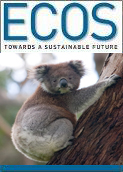
|
Published: 15 April 2013
Switch by switch, we’re changing the world
Earth Hour, held this year on 23 March, is the biggest people-powered action for the environment in history. This year marked the sixth national Earth Hour across Australia and the seventh for Sydney, demonstrating that the potency, power and innovation of the movement is still with us, says Dermot O’Gorman, Chief Executive of WWF-Australia.

|
|
Earth Hour has captured the imagination of millions across the world. Credit:
istock/ randolph badiola
|
In 2013, WWF Australia asked all Australians to switch off for good by switching to renewable energy and it has been inspiring to see thousands of Australians pledging to make the switch.
Earth Hour has always been about empowering people to realise everybody has the power to change the world in which they live, and thousands of people switching to renewable energy is a perfect example.
Already, more than a million Australians have renewable energy powering their homes, so every single commitment adds to this huge movement.
Think about this – one million people switching on renewable energy is the equivalent of planting six million trees, or of removing a huge coal-fired power station from the face of the planet.
The fact that anyone can join in and make such a positive change to our planet is something that I still find deeply impressive.
Seeing Australia create Earth Hour, which has now grown to every corner of the planet, is something that has made me proud as an Australian.
In fact three years ago, I saw the first ever Earth Hour in China. It was amazing standing near the gate of the Forbidden City in Beijing – in a unique time in the country’s history and a fascinating time for conservation – and watching the capital city disappear into darkness.
Considering Earth Hour’s focus on renewables this year, I can’t help but reflect on how quickly China has embraced the renewable energy revolution.
After my five years working in China, I believe the country will be the biggest driver of global change in the renewable energy sector. Chinese production and ingenuity will continue to drive down the prices of renewable technology. And as technology improves and prices drop, making the switch will become increasingly user-friendly. This is having, and will continue to have, a direct impact on our sunburnt country, Australia.
Our world is interconnected like never before. Renewable technology spreads across borders, shoots across continents, and is being mobilised to the neediest areas, from tiny countries in the Pacific that have never had electricity, to remote Indigenous communities in Australia. This interconnectivity makes something like Earth Hour possible.
It’s a truly global event that gathers hundreds of millions of people across the world to rally, show support and to say ‘more action is needed’. This begins with one wonderfully simple action – switching off.
Earth Hour has captured the imagination of millions across Asia, Africa, and Latin America, and the stories we are hearing are truly inspiring.
This year the West Bank and Gaza City took part for the first time, and other countries are using the power of Earth Hour to promote much larger changes within their nations.
Last year in Russia, Earth Hour secured 120,000 signatures on a petition that led to better protection of the country’s seas from oil pollution. And in 2013, it’s aiming to secure over 100,000 signatures again to petition for much-needed amendments to Russian forest legislation that will ban industrial logging in an area twice the size of France.
In Botswana, former President Mr Festus Mogae has made a four-year commitment to plant one million indigenous trees, starting with 100,000 in a severely degraded area in Southern Botswana, called Goodhope.
And across Latin America, preparations for ‘La Hora Del Planeta’ are well underway with goals to establish marine protected areas around Argentina.
These goals would have been inconceivable on that first night back in 2007 when Sydney turned off its lights in a quiet symbol of awareness. Now, we know that we can all change the world we live in, one light at a time.
Dermot O’Gorman began his conservation career as a ranger with NSW National Parks and Wildlife Service, then worked in England where he joined WWF UK in 1998 as Head of Government and Aid Agency Partnerships. Later, he worked in Fiji as WWF’s South Pacific Regional Representative, and in Switzerland on WWF International’s Asia Pacific Program and for WWF China. He took up the role of Chief Executive, WWF-Australia, in 2010. This article first appeared in Open Forum and is republished with permission.



